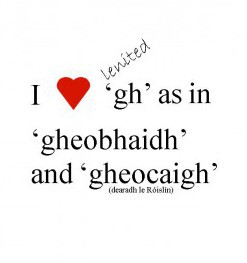When Is “gh” pronounced like “y” in Irish words? Think ‘gheobhaidh’ and ‘gheocaigh’ Posted by róislín on Sep 30, 2015 in Irish Language
(le Róislín)
So, we finally finished that mionsraith about Irish words starting with non-traditional letters in the Irish alphabet (v, w, x, y, z) and even threw in the “-cs-” spelling for “x” (as in “innéacs” or “tacsaí“) for good measure. We’ve previously noted that in Irish, “gh-” and “dh-” at the beginning of a word, often sound like “y,” so in today’s post, we’ll look at a few more examples of “gh-“, starting with one of my all-time favorite Irish words, gheobhaidh. “Dh-” will have to wait for another post.
gheobhaidh [YOH-wee], will get
How does that end up getting pronounced “YOH-wee”? And are there variations?
Well, the “gh” is a lenited “g” (that accounts for the “h”) and it’s followed by the letter “e.” “E” is a “slender” vowel in Irish and that affects how the “gh” is pronounced. “Slender gh,” at least at the beginning of the word sounds like “y” (the “y” sound in “yodel” or “yoyo”)
The “eo” is really just an “oh” sound in Irish, not like English “Leo” (as in the zodiac sign, etc.) and not like Latin “Deo.” There’s one major exception to this pronunciation of “eo” and it’s in a very widely used word, so I’ll mention it here: “seo” and the companion word “anseo.” For “seo” and “anseo,” the “eo” sounds pretty much like “uh,” the vowel sound in “fun” or at the end of “sofa” (not like the “uh” German “Huhn,” which I would transcribe roughly as “oo”). But normally, when we see “eo” in Irish, it’s pronounced “oh” and some additional examples are: beo, Eoin [OH-in], and Tóiceo.
The “bh” in the middle of “gheobhaidh” is essentially a “w” sound (like the “w” in “flower” or “power”), or in some dialects an “f” sound. We also see this “w” sound in words like “abhainn” and “leabhar.” In fact, in 2009, there was a website and campaign called “leabharpower” (a clever rhyming title), to promote reading in Irish. I just checked and apparently the domain name expired, so I guess the activity was just for that one year. Eolas [OH-luss] ag duine ar bith faoi sin? I checked “leabharpower” with “.com,” which I believe was the original website, and that now brings up an Asian exercise site. For good measure, I also checked under the suffixes “.org” and “.ie,” and those pages are unavailable. Cad a tharla do “LeabharPower” — ba mhaith an smaoineamh é! At any rate, the “bh” in “gheobhaidh” is like English “w,” or … what was that about dialects and an “f” sound?
gheobhaidh can also be pronounced “YUH-fuh” or “YOW-uh” (that’s “ow” as in “now” or “cow”) or “YOH-uh.” So the “-bh-” can be pronounced “f” and the vowel sounds be quite varied. But the “gh-” remains some kind of “y” sound.
The ending, “-aidh” is often pronounced “ee,” the “dh” being completely silent. But as in the examples above, the final vowel sound can also be reduced to simply “uh” (again, as in “fun” or the “a” of “sofa”).
So, altogether, we have “gheobhaidh” as “YOH-wee,” “YUH-fuh,” “YOW-uh,” or “YOH-uh.” Any more pronunciations out there?
How about other words starting with “gh-“? Again, this blog is just dealing with “slender gh,” adjacent to “e” or “i.”
an ghealach [un YAL-ukh], the moon
an-gheal [ahn-yal], very bright
a ghéinte [uh YAYN-tchuh], his genes
cairdín an gheocaigh [… un YOHK-ee, or -ig in Munster Irish], the mummer’s accordion
a ghiall [uh YEE-ul] his jaw, or, a completely different word, spelled the same, his hostage
an ghirseach [un YIRzh-shukh], the young girl
cluasa an ghiorria [… un YIR-ee-uh], the ears of the hare
ag seinm an ghiotáir [… un YIT-awrzh]
Some names in direct address that have this “y” sound:
“A Ghearóid!” “Garrett!”
“A Ghearaird!” “Gerard!”
“A Ghearailt!” “Gerald!”
“A Ghearóidín!” “Geraldine!”
Well, that’s an assortment anyway, and hopefully clarifies the pronunciation of “gheobhaidh,” which is a very very basic word in Irish. It means “will get,” and is one of the forms of the verb “faigh” (get). Do you remember some other key forms for this verb, like “I get,” “I got,” and “gotten”? Freagraí thíos. We also looked at some other words that normally start with “g” and change to “gh” under certain grammatical circumstances, like possession or direct address. “Gheobhaidh,” by the way, never shows up with a plain “g” in modern standard Irish. It’s a word that’s considered permanently lenited, like “cheana” or “dhá” (except when “dhá” unlenites to “dá” after “an,” ach sin ábhar blag eile). Hope you found this helpful . Agus tá súil agam go gcuirfidh tú suim sa chéad bhlagmhír eile faoin bhfuaim seo (“gh” mar “y”) .i. “dh” mar “y.” Go dtí sin, SGF — Róislín
Freagraí: faighim (I get), fuair mé (I got), faighte (gotten)

Build vocabulary, practice pronunciation, and more with Transparent Language Online. Available anytime, anywhere, on any device.





Comments:
Peadar:
Looks like a good web site. I’ll make a note of it.
Tagus dut.
Peadr:
Rosalin a showoff, eh? Just you wait!